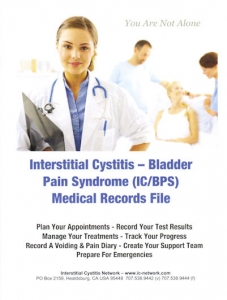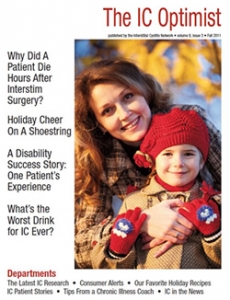 I loved my job working for the Board of Education in my community. Gradually, however, I came to the realization that my IC, IBS and a very severe case of Meniere’s disease had reached the point that working was not possible. I first tried being off for a few months to rest and hopefully get better, but it was not enough. During the school year of 2009-2010, I was only able to work 118 days out of a 259 day work year. The last day that I was physically able to work was June 4, 2010.
I loved my job working for the Board of Education in my community. Gradually, however, I came to the realization that my IC, IBS and a very severe case of Meniere’s disease had reached the point that working was not possible. I first tried being off for a few months to rest and hopefully get better, but it was not enough. During the school year of 2009-2010, I was only able to work 118 days out of a 259 day work year. The last day that I was physically able to work was June 4, 2010.
I first applied for state disability retirement and was denied. I then applied for the private, short-term disability insurance that I had paid for through work. As many other patients can attest, it took a tremendous amount of effort get approved, not the least of which were letters from my various medical care providers to support my case. Ironically, most of my physicians were reluctant to do so despite the fact that they all agreed that I was disabled. Apparently there is a lot of disability fraud going on which makes some doctors reluctant to get involved. Thankfully, after a “heart to heart” conversation with the nurse practitioner in my urologists office, she wrote a lovely letter that directly addressed the disabling nature of my IC. I was also able to get letters from my pain management physician and my family doctor that stated that I was no longer able to work.
… it is very important that both you and your physicians keep a good account of all treatments and procedures.
My short-term disability insurance only lasted for three months and then I had to try for long-term disability. I should emphasize that it is very important that both you and your physicians keep a good account of all treatments and procedures, as well as your physical condition at the time of every office visit. I also kept records of work missed due to pain and when I was unable to drive and needed the assistance of a driver. Based on this information and records, I won the long-term disability fairly easily. It is significant to note that I won both the short-term and the long-term disability insurance payments on interstitial cystitis alone. To me, that is amazing. It is a win for IC and a blessing for me!
Once my long-term disability payments started, the next step that the insurance company wanted me to do was file for social security disability. They suggested that I consider working with SSDC, a social security disability advocacy company that helps process the social security paperwork. Before sending anything to the social security office, they go over every piece of information and dot all of the I’s and cross all of the T’s to ensure a complete and correct application the first time. They acted as my guide throughout the process and were very helpful.
This brings up the question of seeking legal representation. Can an attorney help or even be better than a group like SSDC? Prior to filing, I did talk to an attorney regarding both my private, retirement disability and my social security disability. He reviewed my medical records and said that I had a good case, but that attorneys normally do not get involved unless an appeal is necessary. I also asked about using a firm such as SSDC. He reviewed the fees and said that they were reasonable.
So what should one expect on a social security disability application?
The “Pain and Daily Activities Questionnaire” is approximately five pages long and is very thorough. It is important to be as specific as possible on every question. It even asks who prepares the food in the home and who does the main shopping. It will ask about social activities, the location of pain, all medications and it allows space for a personal statement. It is important to be specific and to write as much as possible to get the full story across to the reviewers.
The “Work History Report” requires a list of specific conditions and how these conditions relate to limitations at work. A claimant will also need a list of every doctor and therapist related to the claim, complete with mailing addresses and phone numbers. They will ask for the dates of first visits, dates of most recent visits, dates of next appointments, the reason for the visits and what treatment was received from each physician for the last calendar year. It is also important to keep a list of all hospital stays and any tests run in the past year along with a list of all prescription medications, the doctor who prescribed them, why they are prescribed and what side effects one has experienced when prescribed these medications. Keeping thorough records is a key.
We are all in this together and praying for a cure. I have IC, but it does not have me.
 I highly recommend the free ICN Medical Records File which is downloadable from the ICN website. This is very helpful in keeping information up to date. I keep a medication list on my computer and update it every time there is a medication change. I also have a surgery list on my computer. When I visit one of my doctors, I simply put a new date at the top of my medication list and print it out and give to the doctor’s office. This is much easier than trying to remember all of the many medications that I am taking on a daily basis. For new physician appointments, I also print out a copy of the numerous surgeries that I have had to add to their new file on me.
I highly recommend the free ICN Medical Records File which is downloadable from the ICN website. This is very helpful in keeping information up to date. I keep a medication list on my computer and update it every time there is a medication change. I also have a surgery list on my computer. When I visit one of my doctors, I simply put a new date at the top of my medication list and print it out and give to the doctor’s office. This is much easier than trying to remember all of the many medications that I am taking on a daily basis. For new physician appointments, I also print out a copy of the numerous surgeries that I have had to add to their new file on me.
The application will require work history going back 15 years, including questions about position with the company, job start date and end date, job duties, and how much time during the day is spent sitting, standing, walking, climbing, lifting and how much one is required to lift. The application will ask the date of the last day physically worked for the company and payroll data including previous year’s and current year’s earnings. In addition, information related to marital status, previous marriages and divorces and name changes is required.
At the end of this form, there is an area for remarks and extra details and this is where I was very thorough and detailed. I included all information that I deemed important.
- I explained that none of my issues were curable, they were only treatable and that I was receiving the only treatments available for my diseases.
- I provided my voiding diary, explaining that it shows that I void 20 – 25 times daily.
- I explained the accommodations that I had tried to make at work, such as purchasing my own office chair, bringing chair cushions, heating pads, cold packs and even toilet paper.
- I explained the difficulty of waking up in the night 3 – 5 times to urinate only to get up at 5:00 a.m. for work.
- I shared that I had missed almost every family function in the previous year due to pain and/or vertigo.
- I wrote about my pain levels and described some of my pain.
- I talked about my Meniere’s disease, dizziness, vertigo, nausea, migraines, depression, IBS, shingles.
- I wrote about the simple daily tasks that I could no longer do, such as being unable to vacuum, mop or cook simple meals.
 In the end, the application was successful and I was approved for benefits the first time out. I can’t tell you how excited and grateful I am. I truly think that someone was watching over me during the entire process. I hope that by relating my experience throughout this process, in some small way, I have been of help to my IC friends. We are all in this together and praying for a cure.
In the end, the application was successful and I was approved for benefits the first time out. I can’t tell you how excited and grateful I am. I truly think that someone was watching over me during the entire process. I hope that by relating my experience throughout this process, in some small way, I have been of help to my IC friends. We are all in this together and praying for a cure.
By Shelia Ricks
Originally published in the IC Optimist Magazine, Fall 2011
Learn more about Disability Insurance in the ICN Disability Resource Center
